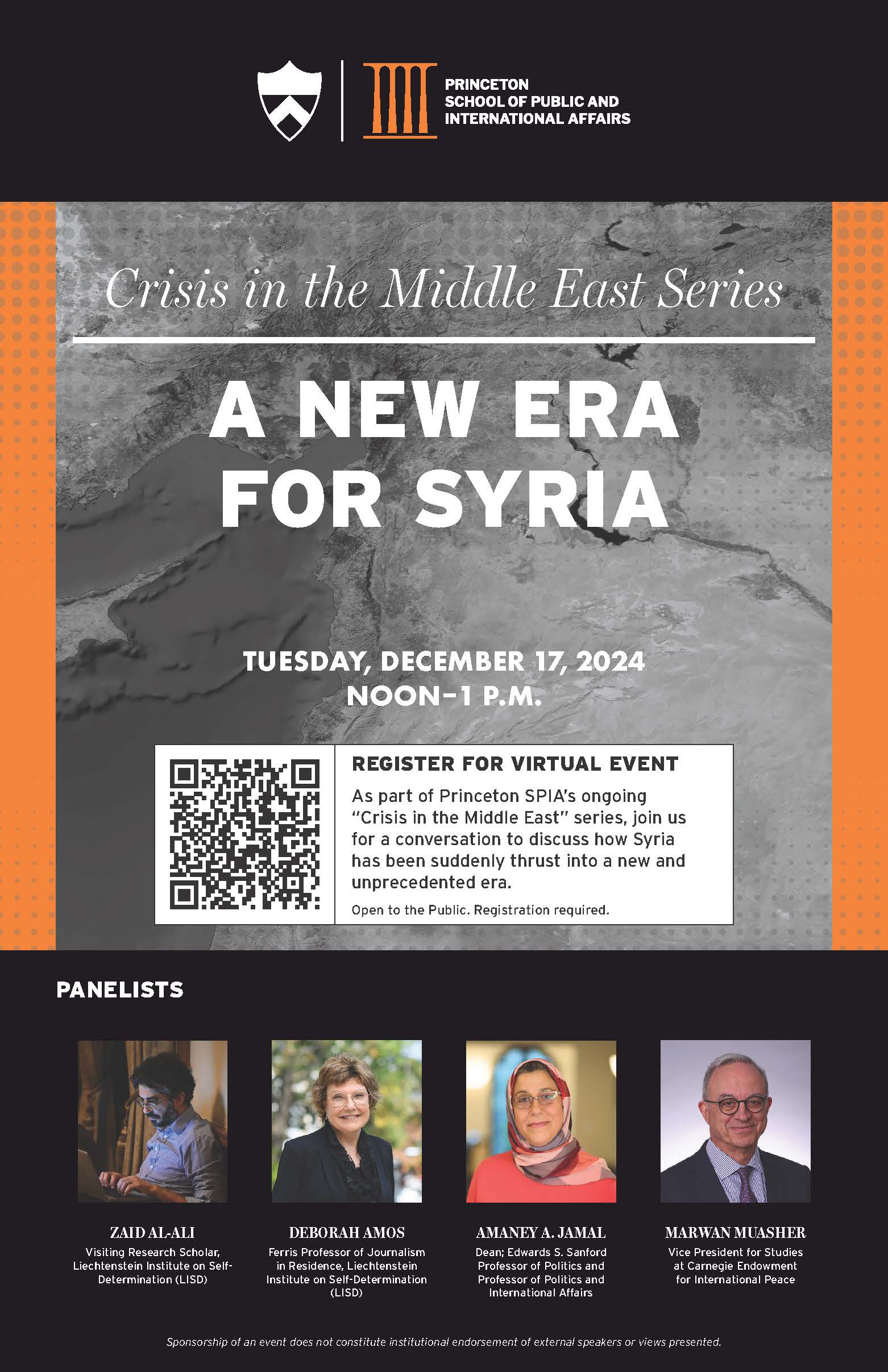
As part of Princeton SPIA's ongoing "Crisis in the Middle East" series, join us for a virtual conversation to discuss how Syria has been suddenly thrust into a new and unprecedented era. What are the factors that contributed to this sudden transformation? What are the prospects for the future, and for its people? Will the conflict continue in a different form, or will the country transition to a new period of stability? And how will its neighbors -- Lebanon, Turkey, Iraq, Jordan, Israel, Palestine -- be impacted?
Biographies
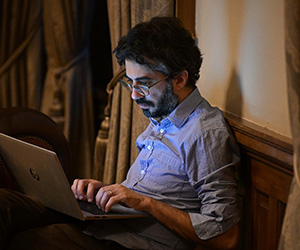 Zaid Al-Ali is a Visiting Research Fellow and Visiting Lecturer at Princeton University and the Senior Programme Manager on Constitution Building for the Arab region at International IDEA. Since 2015, he has been advising transitions, constitutional negotiations and peace processes in countries including Iraq (his home country), Egypt, Libya, Tunisia, Sudan, Yemen, Lebanon and others. He is also the author of the Struggle for Iraq’s Future (Yale, 2014) and Arab Constitutionalism: The Coming Revolution (Cambridge, 2021). Zaid has also acted as an adviser to high level international meetings relating to Syria’s conflict but has kept his distance from direct negotiations involving the now defunct regime in Damascus out of a concern that representatives of the Baath party would never offer meaningful concessions.
Zaid Al-Ali is a Visiting Research Fellow and Visiting Lecturer at Princeton University and the Senior Programme Manager on Constitution Building for the Arab region at International IDEA. Since 2015, he has been advising transitions, constitutional negotiations and peace processes in countries including Iraq (his home country), Egypt, Libya, Tunisia, Sudan, Yemen, Lebanon and others. He is also the author of the Struggle for Iraq’s Future (Yale, 2014) and Arab Constitutionalism: The Coming Revolution (Cambridge, 2021). Zaid has also acted as an adviser to high level international meetings relating to Syria’s conflict but has kept his distance from direct negotiations involving the now defunct regime in Damascus out of a concern that representatives of the Baath party would never offer meaningful concessions.
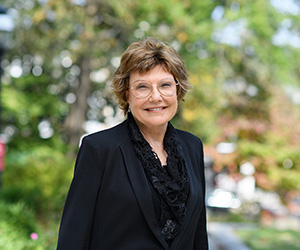 Deborah Amos is a Ferris Professor of Journalism in Residence at Princeton University. A longtime international correspondent, Amos spent much of her award-winning career at National Public Radio. Her reporting on the Middle East and refugees in the U.S. regularly featured on NPR’s Morning Edition, Weekend Edition, and All Things Considered. She recently covered the Syrian and Iraqi refugee crises, the economy in the Middle East, and the Arab youth surge. Previously she reported for ABC’s Nightline and PBS’s Frontline.
Deborah Amos is a Ferris Professor of Journalism in Residence at Princeton University. A longtime international correspondent, Amos spent much of her award-winning career at National Public Radio. Her reporting on the Middle East and refugees in the U.S. regularly featured on NPR’s Morning Edition, Weekend Edition, and All Things Considered. She recently covered the Syrian and Iraqi refugee crises, the economy in the Middle East, and the Arab youth surge. Previously she reported for ABC’s Nightline and PBS’s Frontline.
Amos is the author of two books: Eclipse of the Sunnis: Power, Exile, and Upheaval in the Middle East, and Lines in the Sand: Desert Storm and the Remaking of the Arab World. She has won several major journalism honors, including a Courage in Journalism Award from the International Women’s Media Foundation, a George Foster Peabody Award, an Edward R. Murrow Lifetime Achievement Award, and an Emmy.
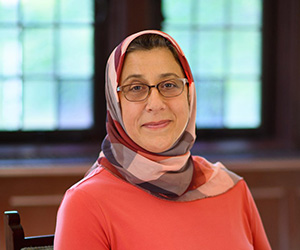 Amaney A. Jamal is Dean of the Princeton School of Public and International Affairs and the Edwards S. Sanford Professor of Politics, and Professor of Politics and International Affairs at Princeton University. She is the former Director of the Mamdouha S. Bobst Center for Peace and Justice. Jamal directs the Workshop on Arab Political Development and the Bobst Center-American University of Beirut Collaborative Initiative.
Amaney A. Jamal is Dean of the Princeton School of Public and International Affairs and the Edwards S. Sanford Professor of Politics, and Professor of Politics and International Affairs at Princeton University. She is the former Director of the Mamdouha S. Bobst Center for Peace and Justice. Jamal directs the Workshop on Arab Political Development and the Bobst Center-American University of Beirut Collaborative Initiative.
Her book, "Barriers to Democracy" (2007), which explores the role of civic associations in promoting democratic effects in the Arab world, won the 2008 American Political Science Best Book Award in the Comparative Democratization section. Her other books include "Of Empires and Citizens" and her co-edited volume "Arab Americans Before and After 9/11." Jamal’s articles have appeared in the American Journal of Political Science, Journal of Politics, Comparative Political Studies, Journal of Conflict Resolution, Comparative Politics, Perspectives on Politics, International Migration Review, and other venues. Her article “Does Islam Play a Role in Anti-Immigrant Sentiment: An Experimental Approach,” in Social Science Research 2015 won the 2016 Louis Wirth Best Article Award: American Sociological Association, International Migration Section.
Jamal is the co-founder and co-principal Investigator of the Arab Barometer Project (Winner of the Best Dataset in the Field of Comparative Politics (Lijphart/Przeworski/Verba Dataset Award 2010), and has secured over $5 million in grants for this and other projects from the U.S.-Middle East Partnership Initiative, National Science Foundation (NSF), NSF: Time-Sharing Experiments for the Social Sciences, Qatar National Research Fund, United States Institute of Peace, the International Development Research Centre, Carnegie Corporation of New York, and the Henry Luce Foundation.
In 2006, Jamal was named a Carnegie Scholar. She holds a Ph.D. from the University of Michigan (2003). Her areas of specialization are the Middle East and North Africa, mass and political behavior, political development and democratization, inequality and economic segregation, Muslim immigration (U.S. and Europe), gender, race, religion, and class.
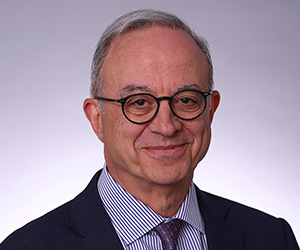 Marwan Muasher is vice president for studies at Carnegie, where he oversees research in Washington and Beirut on the Middle East. Muasher served as foreign minister (2002–2004) and deputy prime minister (2004–2005) of Jordan, and his career has spanned the areas of diplomacy, development, civil society, and communications.
Marwan Muasher is vice president for studies at Carnegie, where he oversees research in Washington and Beirut on the Middle East. Muasher served as foreign minister (2002–2004) and deputy prime minister (2004–2005) of Jordan, and his career has spanned the areas of diplomacy, development, civil society, and communications.
Muasher began his career as a journalist for the Jordan Times. He then served at the Ministry of Planning, at the prime minister’s office as press adviser, and as director of the Jordan Information Bureau in Washington.
In 1995, Muasher opened Jordan’s first embassy in Israel, and in 1996 he became minister of information and the government spokesperson. From 1997 to 2002, he served in Washington again as ambassador, negotiating the first free-trade agreement between the United States and an Arab nation. He then returned to Jordan to serve as foreign minister, where he played a central role in developing the Arab Peace Initiative and the Middle East roadmap.
In 2004, he became deputy prime minister responsible for reform and government performance and led the effort to produce a ten-year plan for political, economic, and social reform. From 2006 to 2007, he was a member of the Jordanian Senate.
From 2007 to 2010, he was senior vice president of external affairs at the World Bank.
He is the author of The Arab Center: The Promise of Moderation (Yale University Press, 2008) and The Second Arab Awakening and the Battle for Pluralism (Yale University Press, 2014).
Sponsorship of an event does not constitute institutional endorsement of external speakers or views presented.


